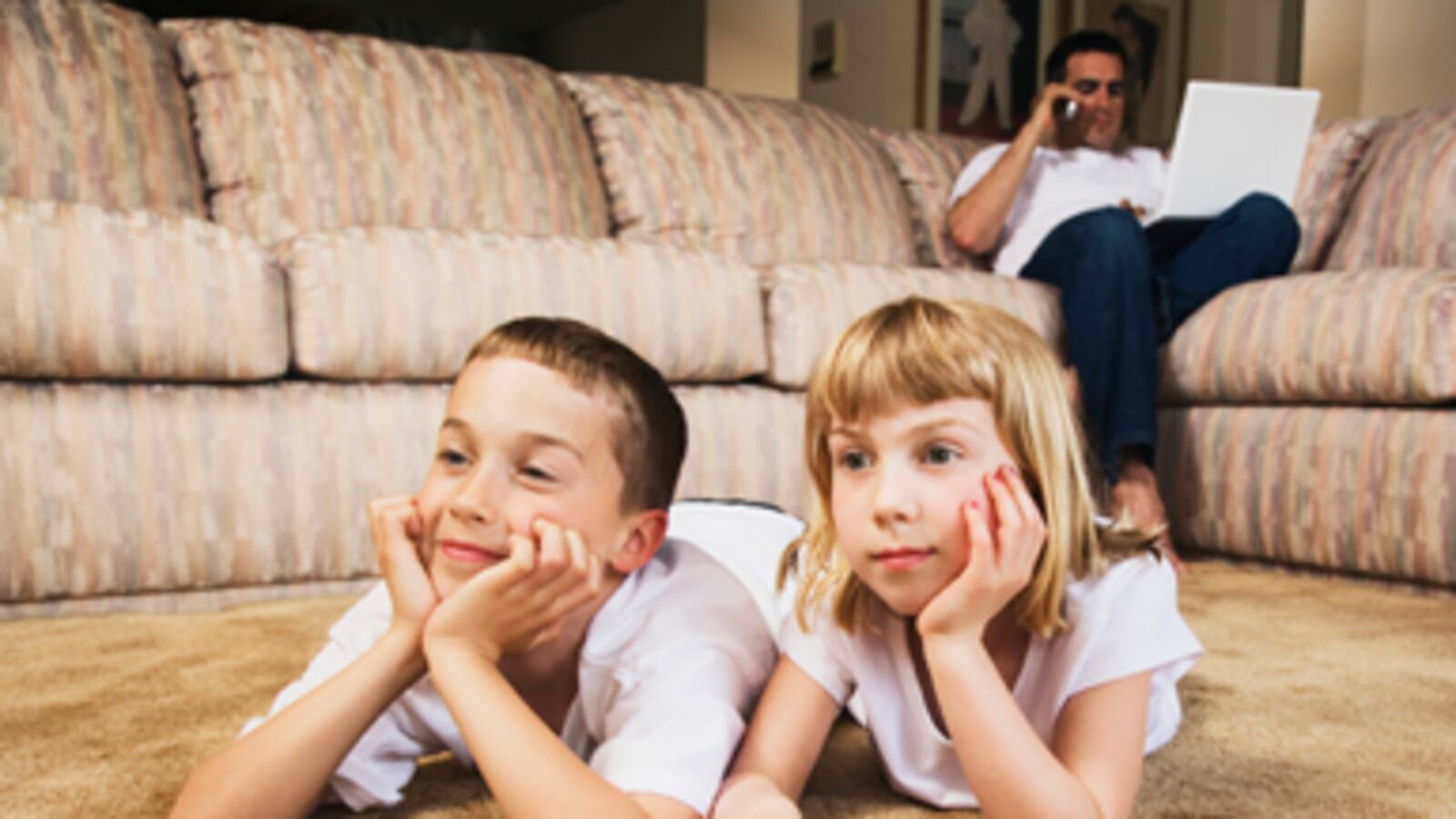Some parents are up in arms over an SAT question that demands knowledge of reality TV. But Kyle Spencer argues that keeping kids sequestered from the boob tube will hurt them later in life. Plus, College Board chief Laurence Bunin defends the essay prompt.
A week ago, my neighbor told me she was banning TV completely in her house. This worried me: Were her kids headed for the hard-charging Ivies, while mine were going to languish in ill-performing community colleges because they'd clocked too much time in front of the tube? I wrung my hands about this until the other day, when a now-infamous SAT question hit the Web.
That's when I breathed a sigh of relief—apparently, knowing the finer points of reality television would help my kids get into college.

Unbeknownst to themselves, the long-venerated College Board, whose members include 5,600 academic institutions, inadvertently stepped into one of the most contentious parenting issues in America. The question that incoming college students taking the SATs were asked to answer is, "How authentic can [reality TV] shows be when producers design challenges for the participants and then editors alter filmed scenes?" For obvious reasons, this has been a great boon for our favorite media outlets. For certain hardcore parents, not so much. While the Web has exploded with comic commentary on how Kim Kardashian's behind is now de rigueur knowledge for aspiring coeds, purist parents who prided themselves on TV-free homes are not laughing.
And now the beleaguered College Board, fighting off accusations that the test has been dumbed down, are shooting back with their own retort: You don't have to be clocking any time in front of the TV to answer a question about it, College Board chief Laurence Bunin wrote in a rebuttal on The Daily Beast. As a writer and a parent, I beg to differ. Of course you do. And guess what? That's not a bad thing. Lee Rosen, the father of a 17 year old who took the test on Saturday, drawing the much-debated question, agrees.
Yes, Lee's son, Toby, classified the question as "really stupid." Apparently, evaluating the veracity of reality TV, a source of timely debate among parents, is, according to the young 'uns, so last year. But Rosen, who practices family law in Raleigh, thought about the question differently. He thinks it's a telling sign of the times, a confirmation that kids need to be exposed to cultural earmarks—even some of the more lowbrow ones—in order to remain hooked into American culture and connected to the country in which they reside.
"A kid who can't answer that question is living on the top of a mountain alone, and I don't want to be raising that kid."
"A kid who can't answer that question is living on the top of a mountain alone," Rosen said. "And I don't want to be raising that kid. I want to raise a kid who has the curiosity and interest that might involve watching Family Guy one day and then live coverage on CNN of the situation unfolding in Japan another. I can't really fathom that it's a good thing to willfully cut your kids off from anything that is such an integral part of our lives. It's just unhealthy."
Television is the most dominant form of cultural expression in our country, beating out movies, print publications, and books, according to research from The Nielsen Company. More than 280 million people young and old tune in daily, watching everything from bikini-clad Jerseyites hanging out in hot tubs to beautifully drawn animals from beloved children's classics in shows like The Adventures of Little Bear. And while Nielsen figures like this one–that the average American spends 20 percent of his or her day watching television–can seem alarming, television's ever-present existence in our lives is a fact. And it can no longer be ignored.
"It's the lens through which many Americans see the world," said Lynne Joyrich, an associate professor in Brown University's department of Modern Culture and Media. "It's incumbent upon us to understand it."
Joyrich says our nation's enormously popular reality TV shows, the ones students were asked to write about on the SAT last week, are particularly pertinent because they deal with some of our culture's most pressing issues. American Idol, Survivor, Big Brother and Top Chef may seem frivolous. But they address complex issues about competition, ambition, and drive, how risk-adverse one should be, how cooperative, and how willing to negotiate. "These shows make people think about things they don't normally think about," says Joyrich. "In fact a lot of them are really about how to participate in the world."
Can that be all bad? For anyone who wants to raise a kid able to survive in the modern world, I'd say no. Which is all to say that every 17 year old should have something intelligent to say about reality TV. And when my kids are 17, I expect them to, too.
This doesn't mean that I advocate a free-for-all TV policy. According to The Kaiser Family Foundation, 70 percent of 8-to-18 year olds have televisions in their bedrooms and 45 percent of them report living in households with the TV on all day. That's bad for everyone. TV viewing is associated with obesity and poor nutrition. And many shows–even ones geared toward kids—are unsuitable for them. (MTV's Sixteen and Pregnant is the most egregious example.)
Still, banning TV completely from your home is not the answer to overly lax TV rules in other homes. "No kid should spend 20 hours a week in front of the television and no time in front of the books," said Deb Carusso, the mother of two college-aged kids who took the SAT a few years ago. "But you've got to let them watch some TV or they're going to be completely unable to relate. TV is now part of the vernacular whether we like it or not. To be culturally literate is to understand it."
Robert Thompson, the director of Syracuse University's Bleier Center for Television and Popular Culture would agree. "You can't be an engaged citizen and not have come to grips with that."
Tessa Jolls at The Center for Media Literacy is part of a growing movement of people who think the question of TV-or-no-TV is passé. Teaching kids to consume media intelligently is where we need to be, she says. TV can be watched in a very sophisticated, discerning manner with an ever-increasing array of new technologies. You can avoid commercials, skip, skim, and rewind. Kids need to learn how to do that. Kids also need to be cognizant of the fact that someone constructed what they're watching, someone chose what to include and what to cut out." They need to learn when they're being pushed a product and when they're watching a dramatic plot point, Jolls says.
Joyrich says that students who don't have that knowledge—either because no one has really talked to them about what they're watching or they haven't watched much TV—can seem naïve and vulnerable when asked to deconstruct what they're experiencing. They would be OK if they could avoid future TV watching. But TV, she points out, is everywhere: at airports, in New York City cabs, in restaurants, and sometimes on the street.
Jolls says media literacy isn't just an entertainment issue. "In this multi-media, globally connected world, it's an absolute necessity," she says, "If you don't provide kids with it, you're denying them a ticket into the work force. You are putting them at a disadvantage."
Raising a kid who could not have answered that SAT question is raising an isolated Luddite who will have a hard time contributing to the democracy we live in. And that seems indefensible. A kid who avoids all TV may have spent more time with headier forms of entertainment. But sadly, they will have a hard time sharing that with their peers because they have no connection to what moves, drives, influences, and connects the majority of them. The next time I hear a parent say, with a smug smile, that their kids don't watch TV, I plan to respond with two words: Good luck!






